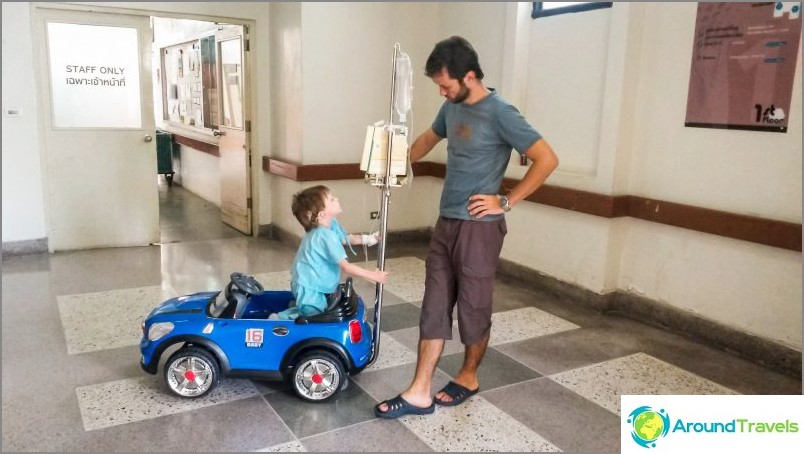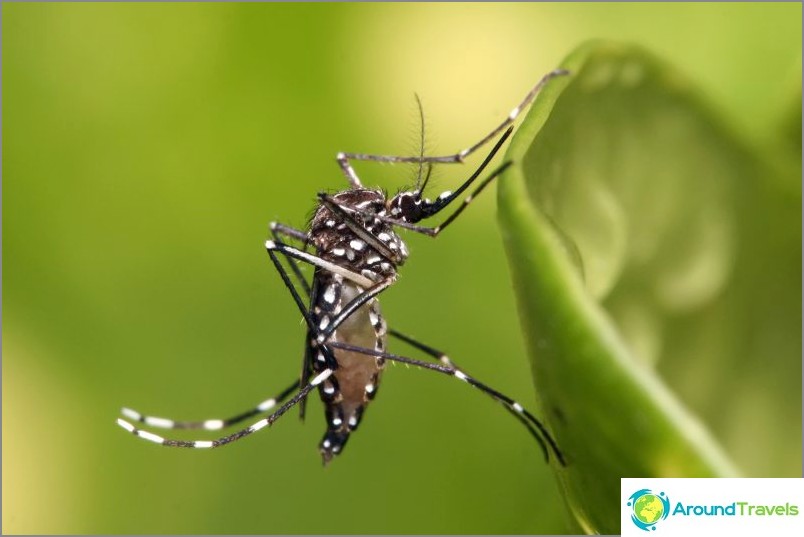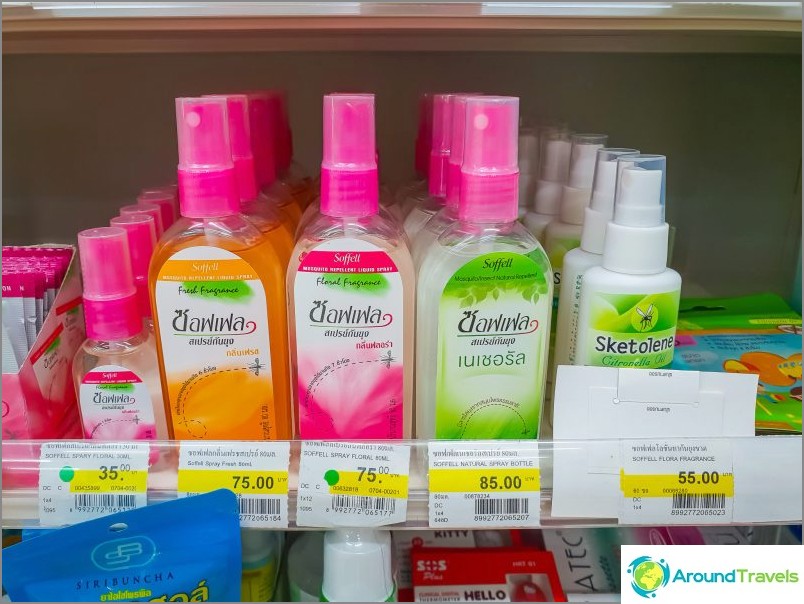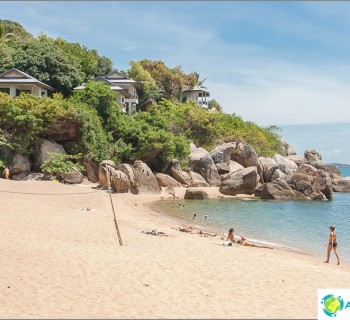I myself have never had Dengue fever (t-t-t), but some of my acquaintances were not so lucky. There are too many myths around this fever lately, so it became necessary to write this post so that you understand what it is, is it worth it, whether it is necessary to make insurance, and in general how to avoid it. I hope this information will help you draw your conclusions..
The content of the article
Dengue fever
Dengue fever has 4 strains (serotypes) that cause it, and 2 forms of the course of the disease: classic Dengue fever and hemorrhagic fever. Hemorrhagic is a more severe and dangerous form, it occurs only in those who have already had one of the strains, and, unfortunately, in newborns, if the mother has already had dengue and the child has received antibodies from her. So when deciding to give birth in Thailand, take care of choosing a very good hospital..
Those who have had Dengue at least once already know everything about its symptoms and treatment, and they are unlikely to read this post. Therefore, further I will write only in the context of the classical form.
Symptoms
Symptoms confirming it will be as follows: chills (the temperature rises sharply to 39-40?), Headache, the area behind the eyes, muscles, spine and joints (mainly knees), a rash appears on the skin. All this begins suddenly, without prior ailments, with rare exceptions, when a person has a headache and a feeling of fatigue six to ten hours before the obvious manifestation of the disease. Nausea, lack of appetite, swelling of the face, swollen lymph nodes, redness of the eyes and throat are also symptoms of Dengue fever..
If the listed symptoms hit the mark on more than three points along with a high fever, then there are three news for you: two good and one bad. The bad news is that about 4-7 days ago, somewhere on the veranda of a hotel or in the evening, in a restaurant, you were bitten by an infected mosquito. Dengue fever is an acute viral illness that has an incubation period of 3 to 14 days, so many «lucky ones» are faced with symptoms already far from the tropics and tropical doctors. The good news is that you are not contagious to others, and Russian doctors have already learned to identify the symptoms of Dengue fever no worse than Thai.
Treatment
In no case should you take ASPIRIN, IBUPROFEN and NUROFEN - this is the main thing that you need to know when symptoms appear in the first days. Until you know Dengue you have or not - consider by default that this is it and take only PARACETAMOL to lower the temperature.
People get sick in different ways, so on the network you can find both a sad experience with a bunch of complications, including death, and cheerful reviews a la «released in a couple of days». One is ill for 2 days, the other can die for 2 weeks and then recover for another month. As a rule, the high temperature subsides after 3-4 days and then rises again for several days, 2 waves. With fever, erythrocytes in the blood fall strongly, and it is for them that Dengue can be 100% confirmed. True, a blood test can be done no earlier than 3-4 days of the course of the disease. That is, you have already rewound half of the term by that time.
Dengue fever is not cured, there is no cure for it at all. Do you have a insurance or not - be sure to go to the hospital. Although, according to some expats, there is no point at all in visiting a doctor if your symptoms show a classic form, and you should run to the doctors when hemorrhagic symptoms appear. But I personally would be reinsured, especially when it comes to a child, for them even the classic form can be difficult. So the doctor will be able to do the same blood test, tell you how to alleviate the course of the disease, and hospitalize if necessary. The main problem in children at high temperatures is dehydration, and sometimes there is no way without a dropper. However, an adult may need a dropper..
- The temperature is brought down with paracetamol every 4-6 hours, observing the dosage according to age and weight. Please note that paracetamol does not immediately provide a relief effect, so you can relieve the condition by rubbing with water.
- Constant and plentiful drink is obligatory, a lot of drinking. Once again, do not miss the child's dehydration, it comes imperceptibly and rather quickly. If you see that the child is weakening, then immediately go to the hospital. Alternatively, force yourself to drink coconut water as a natural electrolyte. And it is not necessary to buy exactly the green coconuts themselves, you can take such bottled water in 7-eleven, sports drinks with electrolytes are also suitable.
- In order not to burden sore joints - bed rest, to relieve pain in the eye area - dim lights and curtains, and sleep. And to relieve aches throughout the body, Thais use a papaya leaf. They buy it ready-made in a bottle at the pharmacy, or prepare it themselves - squeeze it in a juicer, make a decoction or mix it in the form of a smoothie with honey. It tastes just monstrous, but it is a very effective assistant for Dengue..
- If a rash appears that itches terribly, use Calamine, an inexpensive but effective Thai remedy. Look at the skin more carefully, if small red dots appear, as with suction, then the platelets in the blood have dropped to such a level that there is a danger of bleeding and now it is extremely undesirable to injure the skin and mucous membranes (brush your teeth only with rinsing, do not shave).
Due to nausea and lack of appetite, you will not eat, this only increases the loss of strength, moreover, people literally walk holding onto the wall, and in their hands they cannot even hold a spoon. In this regard, of course, Dengue fever is a hell of a hell..

Sometimes Dengue goes to the hospital
How to avoid Dengue
Prophylaxis
Dengue fever is carried by the mosquitoes Aedes Aegypti and Aedes Albopictus. Basically, sources write about edes egypt, although when studying the topic of Dengue, I still did not understand what is the difference between egypt and albopicus. Both striped, both live in urban conditions and easily tolerate near-zero air temperatures, reproduce wherever there is water. After catching an infection from a bat, monkey or a sick person, aedesa remain carriers of the infection until the end of their short life..
The only effective dengue protection you can take for yourself is to frequently use mosquito repellents and creams (available in 7-eleven), spirals and fans in your hotel room or home. Every night before going to bed, do an inspection of every corner of the room and especially in the closets where these bastards like to hide. The Tesco electric swatter will help you a lot with this - an amazingly effective piece..
Hazard peak hours are early morning and one hour after sunset, so avoid fresh water and potentially hazardous areas during these hours, and carry the repellent with you. Try to choose housing with mosquito nets on the windows and no swamp nearby. By the way, in good resorts, anti-mosquito treatment is periodically done..

Mosquito carriers Aedes Aegypti - Photo by Muhammad Mahdi Karim

Mosquito repellents are sold in every 7-eleven
Medical insurance
Another way to protect yourself from the effects of Dengue fever is to buy normal health insurance (my rating of insurance in Tai), which includes Dengue coverage. Look at my rating, it shows which ones are insured and which ones are not. Currently not covered by Dengue: Consent, ERGO, Gaide, VSK.
But, as I already wrote above, during a short vacation it may well be that Dengue you will already be ill at home. However, always make honey insurance on your travels, especially for children. I know what I'm talking about.
Insurance in Thailand>
Hospitalization for Dengue fever is optional, yes. But if the course of the disease is severe or repeated, then you cannot do without a hospital, and medicine in Thailand is expensive. You can, of course, lie down in a state medical institution, but this will be a bed behind a curtain in a general ward for twenty people, with the appropriate entourage. And you can get sick in a separate ward of a decent hospital such as Bandon Hospital or Bangkok Hospital, in the price range from 5-20 thousand baht / day. We spent a week lying under a dropper, then half a year working to pay off a financial gap. Insurance in this regard is a necessary thing, one hospitalization immediately discourages years of insurance.
According to the WHO (World Health Organization) website, a person who has had Dengue receives lifelong immunity to a particular strain and partial (or temporary) immunity to some of the remaining three. If you are unlucky with the second part of the bonuses, then if you are bitten by a mosquito carrying another strain, you have every chance of getting sick even 2 months after recovery.
Dengue fever vaccine
For arrivals for less than a year, the Dengue vaccination on arrival does not make sense.
Since December 2015, information about the vaccine produced by Sanofi Pasteur based on the vaccine has been circulating on the network. «Dengwaxia», which supposedly protects comprehensively from all 4 strains at once. But upon closer examination, it turns out that the current vaccination against Dengue fever is not a panacea at all. On the WHO website, you can find their recommendation - to apply only locally, on local residents, in areas with a real epidemiological threat. As you can imagine, tourists do not belong to this category..
First, for a full effect, the Dengue fever vaccine is given 3 times every half a year: 0 months - 6 months - 12 months. That is, it will begin to work fully only in a year. Getting vaccinated upon arrival in Thailand, even if you plan to spend wintering, is a waste of time and money, because you can pay ~ 7000 baht to doctors for services and vaccines, and after a week get a mosquito bite in a nearby restaurant.
Secondly, even if you are ready to wait a year before flying to Thailand, such vaccination is not given in Russia. Thirdly, the effectiveness of the vaccine depends on the strain (that is, it does not help from all serotypes equally) and on nuances such as age, serological status and some other scary words, from which I realized that as a percentage it can be expressed like this - on average 52%. That is 50-50 that the vaccine will work.
Summarizing what has been said, the Dengue vaccination may be of interest only to Thais and foreigners who have a period of residence of a year or longer, which means that they have more chances to catch Dengue. Moreover, to catch, as a mild form of fever, and hemorrhagic. In the latter case, a vaccination against Dengue fever helps a lot to alleviate the course of a complicated form, although the percentage there too jumps a lot..
The likelihood of getting sick
As a summary, I want to write you the following: despite all of the above, you are less likely to get dengue in the mosquito-insect spot of Thailand than a Thai person to get the flu in a subway car in winter. Dengue is a virus that runs without snot, cough and is not airborne, unlike the flu. That is, you do not need to isolate yourself from your family or hide from a sick spouse..
The risk of complications or death with influenza is no less likely than that of Dengue. It's just that the media (and this is where all fears and fears are spread) do not like to talk about Russian misfortunes such as tuleremia mosquitoes or encephalitis ticks, and flu epidemics have not raised ratings for a long time like the exotic Dengue fever, which «raging» in Southeast Asia. As soon as you meet another panic message about a massive illness in Thailand - wave your hand at it and do not try to return tickets.


